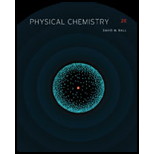
PHYSICAL CHEMISTRY-STUDENT SOLN.MAN.
2nd Edition
ISBN: 9781285074788
Author: Ball
Publisher: CENGAGE L
expand_more
expand_more
format_list_bulleted
Question
Chapter 16, Problem 16.25E
Interpretation Introduction
Interpretation:
The total number of ESR signals that are expected from the structure of the cycloheptatrienyl radical is to be stated.
Concept introduction:
The full form of ESR spectroscopy is electron-spin resonance spectroscopy. The ESR spectroscopy is used to observe those materials which contain unpaired electrons. ESR spectroscopy also works like NMR spectroscopy, but, in ESR, electron spin in spite of atomic nuclei spin gets excited.
Expert Solution & Answer
Want to see the full answer?
Check out a sample textbook solution
Students have asked these similar questions
Draw a stepwise mechanism for the following reaction.
OH
Help with annotating the labeled peaks in the 'H NMR (solvent CDCls) spectra and 'H NMR (solvent Acetone-D6) spectra Also help with Calculating the keto-enol tautomerization Ka constant for the product in both solvents.Two solvents and two different Ka
Draw a Haworth projection of a common cyclic form of this monosaccharide
CH₂OH
HO
H
HO
H
H
OH
CH₂OH
Chapter 16 Solutions
PHYSICAL CHEMISTRY-STUDENT SOLN.MAN.
Ch. 16 - Prob. 16.1ECh. 16 - Prob. 16.2ECh. 16 - Prob. 16.3ECh. 16 - Prob. 16.4ECh. 16 - Prob. 16.5ECh. 16 - Prob. 16.6ECh. 16 - Prob. 16.7ECh. 16 - Prob. 16.8ECh. 16 - Prob. 16.9ECh. 16 - Prob. 16.10E
Ch. 16 - Prob. 16.11ECh. 16 - Prob. 16.12ECh. 16 - Prob. 16.13ECh. 16 - Prob. 16.14ECh. 16 - Prob. 16.15ECh. 16 - Prob. 16.16ECh. 16 - Prob. 16.17ECh. 16 - Prob. 16.18ECh. 16 - Prob. 16.19ECh. 16 - Prob. 16.20ECh. 16 - Prob. 16.21ECh. 16 - Prob. 16.22ECh. 16 - Prob. 16.23ECh. 16 - Prob. 16.24ECh. 16 - Prob. 16.25ECh. 16 - Prob. 16.26ECh. 16 - Prob. 16.27ECh. 16 - Prob. 16.28ECh. 16 - Prob. 16.29ECh. 16 - Prob. 16.30ECh. 16 - Prob. 16.31ECh. 16 - Prob. 16.32ECh. 16 - Prob. 16.33ECh. 16 - Prob. 16.34ECh. 16 - Prob. 16.35ECh. 16 - Prob. 16.36ECh. 16 - Prob. 16.37ECh. 16 - Prob. 16.38ECh. 16 - Prob. 16.39ECh. 16 - Prob. 16.40ECh. 16 - Prob. 16.41ECh. 16 - Prob. 16.42ECh. 16 - Prob. 16.43ECh. 16 - Prob. 16.44ECh. 16 - Prob. 16.45ECh. 16 - a The structure of 2 chloroethanol is usually...Ch. 16 - Prob. 16.47ECh. 16 - Prob. 16.48ECh. 16 - Prob. 16.49ECh. 16 - Prob. 16.50ECh. 16 - Prob. 16.51ECh. 16 - Prob. 16.52ECh. 16 - Prob. 16.53ECh. 16 - Prob. 16.54ECh. 16 - Prob. 16.55ECh. 16 - Prob. 16.56ECh. 16 - A microwave oven emits radiation having a...
Knowledge Booster
Similar questions
- Can you explain how I get these here and show the steps plz?arrow_forwardGive the IUPAC name for this compound Hydrocarbon Condensed Formulas Hint C2H5 CH2CH3 expand that in all the formula Part A: (CH3)2CHCH(C2H5)CH2CH2CH3 Give the IUPAC name for this compound. Part B: CH2=C(C2H5)CH2CH2CH3 Give the IUPAC name for this compound. Part C: (CH3)2C=CHC(C2H5)=CH2 Give the IUPAC name for this compound. Part D: CH3C=CCH(C2H5)2 Give the IUPAC name for this compound. Part E: (CH3)3CC=CCH2CH=C(CH3)2arrow_forwardSelect/ Match the correct letter from the image below for the IUPAC names given below: A B C D 3 E F G H K L Part 1. 4-methylheptane For example.mmmm Answer Letter H _for part 1 Part 2. 2,4-dimethylhexane Part 3. 2,3-dimethylpentane Part 4. 2,2-dimethylhexane Part 5. 2-ethyl-1,1,3,3-tetramethylcyclopentane Part 6. 3-ethyl-2-methylpentanearrow_forward
- Can u show the process as to how to get these?arrow_forwardSketch the expected 'H NMR spectra for the following compound. Label all of the H's in the structure and the corresponding signal for the spectra you sketch. Make sure you include the integration value and the splitting pattern for each signal Indicate how many signals you would expect in the 13C NMRarrow_forwardUse IUPAC naming rules to name the following hydrocarbon compounds: CH2-CH3 | a) CH-CH-CH2-CH-CH-CH3 b) | CH2 CH3 | CH3 CH3 \ / C=C H 1 H CH2-CH3 c) d) CH=C-CH3 e) CH3-CH2-CH2-CH=CH-CH3 f) CH2=CH-CH2-CH=CH-CH3 g) CH3-CH2-C = C-CH2-CH3 h)arrow_forward
- Q5 Name the following : a. b. C. d. e.arrow_forward25. Predict the major product of the following reaction. 1 equivalent of each of the starting materials was used. H₂C CH3 CH3 H3C H3C H3C. CH2 + H3C. heat CH3 CH H.C. CH3 H.C H.C CH3 CH CH3 CH3 A B C Earrow_forwardFind chemical structures based on the below information. a) Chemical formula C6H8O Compound is aromatic plus has two 1H NMR peaks that integrated for 3 each that are singlets (it could have more peaks in the 1H NMR b) Chemical Formula: C6H100 Compounds is conjugated 'H NMR has a signal that integrates for 6 and is a doublet IR spectra has a signal at 1730 cm-1arrow_forward
- Jaslev Propose a synthesis of the following starting from benzene and any other reagents and chemicals. No mechanisms are required. Indicate the condition for each step plus the major product for each step. More than two steps are required. Step 1 Step 2 مہد Brarrow_forwardPart C: The line formula for another branched alkane is shown below. i. In the IUPAC system what is the root or base name of this compound? ii. How many alkyl substituents are attached to the longest chain? iii. Give the IUPAC name for this compound.arrow_forwardPart D: Draw the Structural Formula for 4-ethyl-2-methylhexane Part E. Draw the Structural Formula for 1-chloro-3,3-diethylpentane (Chloro = Cl)arrow_forward
arrow_back_ios
SEE MORE QUESTIONS
arrow_forward_ios
Recommended textbooks for you
 Principles of Modern ChemistryChemistryISBN:9781305079113Author:David W. Oxtoby, H. Pat Gillis, Laurie J. ButlerPublisher:Cengage Learning
Principles of Modern ChemistryChemistryISBN:9781305079113Author:David W. Oxtoby, H. Pat Gillis, Laurie J. ButlerPublisher:Cengage Learning Principles of Instrumental AnalysisChemistryISBN:9781305577213Author:Douglas A. Skoog, F. James Holler, Stanley R. CrouchPublisher:Cengage Learning
Principles of Instrumental AnalysisChemistryISBN:9781305577213Author:Douglas A. Skoog, F. James Holler, Stanley R. CrouchPublisher:Cengage Learning

Principles of Modern Chemistry
Chemistry
ISBN:9781305079113
Author:David W. Oxtoby, H. Pat Gillis, Laurie J. Butler
Publisher:Cengage Learning

Principles of Instrumental Analysis
Chemistry
ISBN:9781305577213
Author:Douglas A. Skoog, F. James Holler, Stanley R. Crouch
Publisher:Cengage Learning